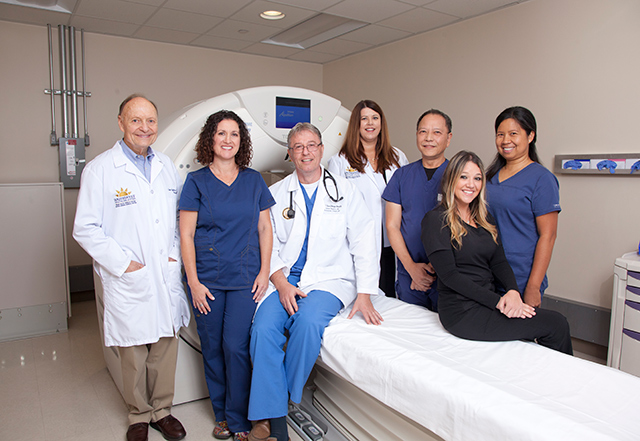Prompt, Expert Treatment for Stroke Patients
Southwest Healthcare Rancho Springs Hospital's multidisciplinary stroke team, which includes emergency personnel, neurologists, neurosurgeons and radiologists, are ready 24 hours a day to quickly respond to stroke emergencies and begin treatment. Services and treatments for patients are focused on stroke education, prevention, intervention and rehabilitation. Southwest Healthcare also offers 24/7 tele-neurology services provided by vascular neurologists from UC San Diego Health.
Our team uses Applied Artificial Intelligence software, which helps enable quick detection and notification of suspected large vessel occlusions (LVO) in the brain.
Advanced Primary Stroke Center
Rancho Springs Hospital has been certified by The Joint Commission as an Advanced Primary Stroke Center since 2015. This distinction recognizes centers that make exceptional efforts to foster better outcomes for stroke care.

We have also been recognized by the American Heart Association® and the American Stroke Association® for our commitment to providing appropriate treatment using evidence-based care by being awarded the Get With The Guidelines®-Stroke GOLD PLUS with Honor Roll Elite designation and the Target Stroke: Type 2 Diabetes Honor Roll Achievement Award.

Stroke Explained
A stroke is what occurs when blood flow to the brain is blocked or stopped. Within a few minutes of a stroke, brain cells begin to die. According to the American Heart Association, stroke is the third leading cause of death in the US and can lead to long-term disability. Problems that can arise include weakness in an arm or leg after a small stroke to paralysis and loss of speech in larger strokes. This is why it's so important for someone who is having a stroke to get medical attention as quickly as possible. Stroke affects about one person every four minutes in the US, according to the Centers for Disease Control and Prevention.
Stroke Types and Symptoms
There are two kinds of stroke: ischemic and hemorrhagic. In ischemic stroke, the most common type, a blood clot blocks a blood vessel in the brain. In hemorrhagic stroke, a blood vessel breaks and bleeds into the brain. Symptoms of possible stroke include:
- Numbness or weakness of the face, arm or leg — especially on one side of the body
- Difficulty with speaking or understanding speech
- Trouble seeing in one or both eyes
- Trouble walking, dizziness, loss of balance or coordination
- Severe headache with no known cause
Think FAST
If you or someone you are with has any of these symptoms, call 9-1-1 or get yourself or them to a hospital immediately. Staff in the emergency department will administer acute stroke medications to try to stop a stroke while it is happening. Ischemic stroke, the most common type of stroke, is treated with the "clot-busting" drug known as tPA. The drug must be given to patients within three- to four-and-a-half hours after the onset of stroke symptoms, and preferably sooner.
Use the acronym FAST to quickly identify possible strokes:
Smile. Does one side of the face droop? Can you see the same number of teeth on each side of the face?
Hold up both arms for 10 seconds. Does one drift downward?
Repeat a simple sentence. Is the speech slurred or strange? Can you understand the person?
If these signs are present, every second counts. Call 9-1-1 immediately.
Preventing Stroke
The best way to prevent a stroke is knowing your risk factors. You can lower your risk by:
- Keeping your blood pressure controlled through lifestyle changes and/or medications
- Not smoking
- Taking steps to manage your cholesterol
- Limiting your alcohol consumption
- Exercising regularly
- Maintaining a healthy weight
- Keeping up with your regularly scheduled physician appointments
Get a Physician Referral
For a non-emergency referral to a physician at Rancho Springs Hospital who can help assess your risk for stroke, call our free physician referral service at 1-800-879-1020.

